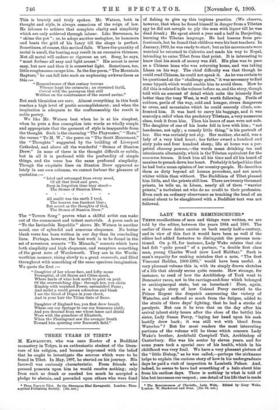THREE YEARS IN TIBET.*
M. KAWAGUCHI, who was once Rector of a Buddhist monastery in Tokyo, is an enthusiastic student of the litera- ture of his religion, and became impressed with the belief that he ought to investigate the sources which were to be found in 'Met. In May, 1897, he started on his journey. His farewell was curiously characteristic. From friends who pressed presents upon him he would receive nothing; only from such as drank or smoked too much he accepted a pledge to abstain, and prevailed upon others who were fond * Three Years in Tibet. By the Shramana Ekai Kawaguchi. London: Theo- sophical PUblishing Society. 1163. net.] of fishing to give up this impious practice. (We observe, however, that when he found himself in danger from a Tibetan spy he did not scruple to ply the man with liquor till he was dead drunk.) He spent about a year and a half in Darjeeling, learning the Tibetan language. He had lessons from pro- fessionals, but he found that children were his best teachers. In January,1899, he was ready to start; but as his movements were watched he returned to Calcutta and made his way to Nepal, intending to enter Tibet from that point. It is interesting to know that his stock of money was £42. His plan was to pass as a Chinese lama who was returning home, and was taking Lhasa on his way. The chief difficulty was that though he could read Chinese, he could not speak it. As he was certain to be questioned at the "challenge gates," it was necessary to find some bypath which would enable him to avoid them. How he did this is related in the volume before us, and the story, though told with an amount of detail which suits the leisurely East better than the busy West, is well worth following. Perils of robbers, perils of the way, cold and hunger, rivers dangerous to cross, and mountains which he could scarcely climb, con- fronted him. It was hard to carry his baggage, and it was scarcely a relief when the predatory Tibetans, a very numerous class, took it from him. Then his hours of ease were not safe. The daughter of one of his hosts fell in love with him ; "not handsome, not ugly ; a comely little thing," is his portrait of her. She was certainly not shy. Her mother, she said, was a lady of a very kind heart; her father owned a hundred and sixty yaks and four hundred sheep ; life at home was a per- petual chacang penona,—the words mean drinking tea and intoxicants alternately, which is the Tibetan equivalent for the swntmum bonzon. It took him all his time and all his hoard of maxims to preach down her heart. Probably it helped him that he had but a mean opinion of her country-people. He describes them as dirty beyond all human precedent, and not much whiter within than without. The Buddhism of Tibet pleased him little, and the priests still less. There are twenty thousand priests, he tells us, in Lhasa, nearly all of them "warrior priests," a turbulent set who do no credit to their profession. Even such an ordinary observance as touching the head of an animal about to be slaughtered with a Buddhist text was not followed.






























































 Previous page
Previous page